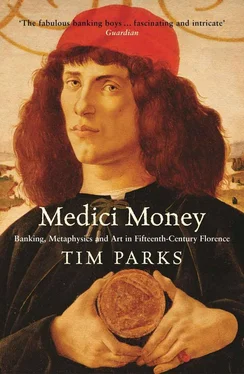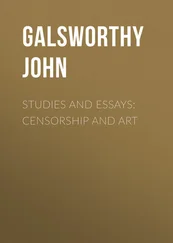In Milan, the fat, mad, aging Visconti had no legitimate off-spring, just one bastard daughter, Bianca. Sforza wanted her for his wife, together with the Milanese dukedom. He wouldn’t fight against Visconti while that marriage was in the cards. Or not north of the Po, in Visconti’s sphere of influence (he later changed his mind). At the same time, the combination Sforza — Visconti, should the condottiere fight with the duke, was the one feasible alliance capable of inflicting decisive military defeat on Florence. The duke had tied Sforza’s hands with the tease of his daughter, constantly promising that the marriage was about to take place, then inventing reasons for delay. Cosimo responded by tying the condottiere with his cash. Sforza could hardly fight for Visconti and the Albizzi if his army was fed and clothed by the Medici.
The Ancona adventure, though short-lived, marked a turning point in the history of the bank. It fused its destiny with that of the Florentine state. Here was a branch that lent mainly for political purposes, without expecting to recover its capital. Not good news for the small investor. Matters of state go beyond the rationale of any commercial venture. Thirty years later, Sforza would owe the Medici bank something in the region of 190,000 florins, a sum far beyond repayment. This was how the Bardi and Peruzzi banks had gone under years ago. But in 1440, Piccinino, Milan, and the Albizzi faction were decisively beaten by the Florentines at Anghiari, to the south east of the city. Sforza, the most successful military adventurer of the fifteenth century, was up north fighting in the Veneto. He never attacked Florence, despite the fact that the Florentines were his future father-in-law’s bitterest enemies.
IT WAS THE period of the bank’s maximum expansion. In 1442, a branch was set up in the subject coastal town of Pisa, whence the Florentine galleys set out every spring for Bruges and London. State-built and with a monopoly on all sea trade in and out of Pisa and Florence, the galleys were rented to merchants who then sold space to others. The right to rent for each voyage was auctioned off in a contest that lasted an hour, or the time it took for a particular candle to burn out. The smarter merchants waited till the flame began to gutter before beginning to bid. So it was decided that the auction would end with the chiming of the clock on the tower of the Palazzo della Signoria — audible but not visible from the auction room. Without a wristwatch, this was nerve-wracking stuff. The palazzo ’s clock-minder was put under armed guard for the duration, lest the hour should shrink or expand. In this etiquette-obsessed world, cheating is the rule. Alertness is all. Nobody is fooled, for example, when the auctioneer plants dummy bids to get things going.
To set up a branch of the bank meant finding a house with a suitable room for the obligatory green table, as well as storage space for goods in transit. The half-dozen employees would then live and eat there together. To oversee the new venture in Pisa, Cosimo went to the town himself. For a two-month stay away from home, he took with him a trunk of books and his best ceremonial armor. He collected the stuff: swords with red velvet sheaths, painted lances, a silver-decorated helmet with a crest in the form of a gilded eagle, a shield picturing a young girl. He also collected books, of course, and was friends with Florence’s leading humanists, who wrote or translated those books and often dedicated them to him. Common to the two areas of interest — books, arms — was the vision of a noble, superior man with an innate dignity that had nothing to do with Christian humility, the kind of dignity that painters and sculptors were learning to conjure up in the faces and postures of their figures.
“Only the little people and lower orders of a city are controlled by your laws …,” says a speaker in one of humanist Poggio Bracciolini’s philosophical dialogues. Cosimo had once taken time out with Poggio to explore Roman ruins in Ostia. “The more powerful civic leaders transgress their power.” That was an interesting idea, for a civic leader. It referred to the kind of man, surely, who, if he hadn’t suffered from crippling gout, might have worn a helmet with a gilded eagle.
Along with all the calculation of profit and loss, there is, then, in Cosimo’s mind, an ideal of fame and fine deeds that will survive the grave. “All famous and memorable deeds spring from injustice and unlawful violence,” says Poggio’s man in the dialogue. What a shame, Cosimo complained, that they had never captured Lucca! Perhaps one day, if sufficiently well paid, Francesco Sforza would help them do that. Then he, Cosimo, would be remembered as the city’s leading citizen when Lucca was taken, as the Albizzi family, though exiled, was still remembered for having taken this proud town of Pisa, where, as always when establishing a new branch, Cosimo now faced the problem of how to register the operation. If a branch was registered with the Medici name, it would have more prestige and attract more investment. But in that case, the Medici holding would have to assume unlimited liability. If it took the name of the resident local partner who actually ran the branch, then Medici liability was limited to the capital actually invested, but the branch’s prestige would suffer. Despite his ceremonial armor and incendiary reading, cautious Cosimo almost always opted for the latter solution, at least for the first few years. The Pisa branch opened under the names of Ugolino Martelli and Matteo Masi. In 1450, when serious losses forced the Medici holding to put a limit on its liability in the London and Bruges branches, which thus renounced the Medici name and emblem, the other Italian merchants took pleasure in the reversal and “cawed like so many crows.” Like profit and loss, renown and ridicule are never far apart.
One wished to be honored long after one was dead, like a Roman senator (Cosimo collected Roman coins as well), but by that time, surely, the superior man would have humbled himself before his Maker and flown to heavenly glory, where such earthly honor could hardly matter. There was even the danger that chasing earthly honor might cost you your place in heaven.
Here, then, was another set of irreconcilables, and if the conundrum this time lay in the mind, or in metaphysics, rather than in the balance of world trade, it was no less urgent for that. Florence had two ideal visions of itself: It was the true inheritor of ancient Rome, eternal renown, wise republicanism; and it was also the city of God. Why else would the government insist that prostitutes dress as described in the Book of Isaiah? Why would there be talk of a crusade to bring the Holy Sepulchre to Florence? Centuries later, England would entertain the same delirium of piety and empire, producing that curious hybrid, the Christian gentleman. Some Americans still think these thoughts today, trying not to see the contradictions between Christian Puritanism and world domination.
Enamored of both visions, Cosimo attended regular discussions with Bracciolini, Niccoli, and other avant-garde humanists, and likewise regular meetings of the religious confraternity dedicated to the Magi. That he did sense a contradiction between political ambition and religious belief is evident from his famous remark, upon being accused of cruelty in exiling so many enemies, that “you can’t run a state with paternosters.” Christian charity takes the back seat when you’re dealing with political necessity.
But contradictions, of course, were there to be overcome. That had always been Cosimo’s attitude. And when it came to the conflicting claims of Christian devotion and secular fame, the most effective way to resolve the problem, as Cosimo had learned from the commissioning of Giovanni XXIII’s tomb, was through art and architecture. “I know the Florentines,” Cosimo told his bookseller and later biographer, Vespasiano da Bisticci. “Before fifty years are up we’ll be expelled, but my buildings will remain.” Most of those buildings were religious. You lavished money on the sacred, to gain earthly fame. And a place in heaven. Apparently you could have your cake and eat it too. Or have your wife drunk and the wine keg full, as the Italians say.
Читать дальше












